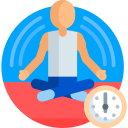Quick Self-Care Practices for Busy Professionals

Conscious Breathing
Conscious breathing is a powerful way to anchor yourself first thing in the morning. By inhaling deeply and exhaling slowly, you activate your parasympathetic nervous system, promoting relaxation and mental clarity. Just three to five minutes spent focusing on your breath can diminish anxiety and help you approach the day with greater equanimity. This practice doesn’t require silence or solitude; it can even be done while getting ready or during your commute. Over time, conscious breathing becomes an automatic tool for combating stress.

Setting Intentions
Before your day becomes a blur of meetings and emails, pause to set a purposeful intention. This is a brief mental exercise where you decide what attitude or goal will guide your actions. Whether it’s practicing patience, expressing gratitude, or staying focused on priorities, intentions act as an invisible framework for your decisions and responses. Clarifying your intentions keeps you on track when distractions arise, and fosters a more mindful approach to professional life.

Journaling Reflections
Taking a few minutes to jot down your thoughts in a journal can have profound effects on your mindset. This ritual offers a safe space to process emotions and map out objectives before the busyness begins. Recording reflections, gratitude, or anticipated challenges helps clarify your thoughts and diffuse stress. Regular journaling also serves as a point of reference to measure growth and celebrate small victories, reinforcing a habit of self-awareness.

Desk Stretching
Long hours at a desk can lead to stiffness, discomfort, and reduced focus. Desk stretching provides immediate relief by loosening tight muscles and encouraging better posture without leaving your workstation. Focus on stretches that target your neck, shoulders, wrists, and lower back, releasing accumulated tension. These simple movements only take a minute or two, yet they foster increased alertness and significantly diminish the aches associated with sedentary workdays.

Walking Meetings
Walking meetings are an inventive way to incorporate physical activity into daily work commitments. Rather than sitting in a conference room or on video call, suggest taking conversations on the move, either virtually with headphones or in-person with colleagues. The act of walking not only boosts creativity and mental clarity but also provides a natural energy lift. This approach enables you to maintain momentum while tending to your body’s need for movement.

Posture Reset
Regularly checking and adjusting your posture is a subtle yet impactful self-care practice. The demands of computer-based work can cause slouching or hunching, which contributes to fatigue and discomfort. Setting micro-reminders every hour to realign your spine, relax your shoulders, and plant your feet firmly on the ground can have cumulative benefits. Enhanced posture supports optimal breathing, reduces aches, and conveys confidence—benefiting both your wellness and professional presence.
Digital Detox Mini-Sessions
Dedicating small windows of time—such as five minutes every couple of hours—to step away from all screens reenergizes your nervous system. Use these breaks to stretch, look out a window, or simply enjoy a moment of stillness without digital interruptions. Over the course of a busy day, these mini-resets reduce eye strain and cognitive overload, enhancing your ability to concentrate and find creative solutions when you return to your tasks.

Nourishing Nutrition Strategies
Preparing nutrient-rich snacks in advance provides a healthy buffer against dips in energy and concentration. Opt for options like nuts, fruit, yogurt, or cut vegetables—foods that are quick to consume and provide lasting fuel. Keeping these snacks within easy reach minimizes the temptation for processed convenience foods that lead to energy crashes. Strategic snacking also encourages regular refueling, supporting brain and body function throughout long work stretches.
Previous
Next

The Power of the Pause
Taking a deliberate pause between tasks or meetings fosters transition and prevents overwhelm. Even twenty to thirty seconds of stillness can signal your mind to reset, lowering stress hormones and improving readiness for what’s next. Whether it’s closing your eyes, placing a hand over your heart, or simply taking a gentle breath, the power of the pause offers a moment to regroup and move forward deliberately.
Progressive Relaxation
Progressive relaxation is a technique involving the intentional tensing and releasing of muscle groups to quickly dissipate physical tension. Practiced discreetly at your desk or in a break room, this method brings awareness to areas of tightness and invites release. By systematically relaxing your muscles from head to toe, you signal your body it is safe to let go of accumulated stress, enhancing comfort and focus for the remainder of your workday.
Soothing Visualization
Guided visualization involves briefly picturing a scene or outcome that evokes calm and positivity. In moments of heightened stress or frustration, envisioning a peaceful place or visualizing yourself succeeding in a challenging task can rapidly shift your mental state. This imaginative exercise doesn’t require special tools or privacy—it’s a mental sanctuary available anytime, providing instant perspective and emotional grounding.
Previous slide
Next slide

Rapid Mood-Enhancement Techniques
Uplifting Music Moments
Listening to energizing or soothing music, even briefly, can trigger chemical shifts in the brain that enhance mood and reduce anxiety. Craft a short playlist of your favorite tracks and press play during breaks or while performing routine tasks. The rhythm, melody, and lyrics can act as instant mood boosters, elevating energy, and infusing your work with enjoyment. Music provides an accessible and personal form of emotional regulation throughout the day.
Positive Self-Talk
Harnessing the power of self-talk involves consciously replacing critical or stress-laden thoughts with affirming, supportive messages. When self-doubt or frustration arises, pause to remind yourself of past achievements or repeat uplifting affirmations. This practice, while simple, can be incredibly effective in bolstering confidence, recalibrating your focus, and fostering a more constructive inner dialogue, especially when work pressures mount.
Nature Connection
Integrating brief moments of connection with nature—even if only by looking at a houseplant, gazing out a window, or stepping outside for a minute—can quickly soothe frazzled nerves and enhance positivity. Nature exposure, however fleeting, has been shown to reduce stress and restore attention. Find ways to incorporate natural elements into your workspace or carve out tiny excursions outdoors when feasible, anchoring yourself in the calming presence of the natural world.
